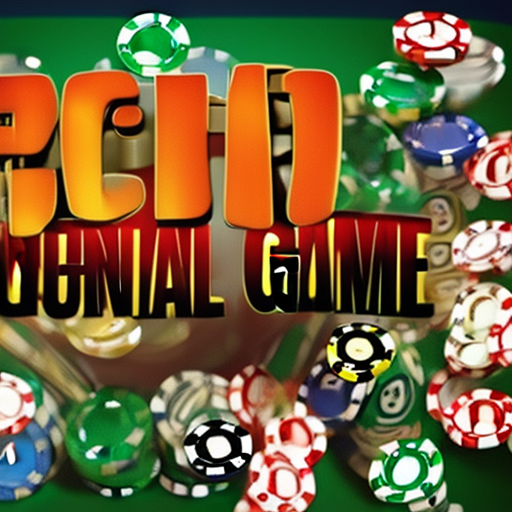Do you consider yourself a poker shark? Have you ever wondered what makes a good poker player successful? Sure, some luck may be involved, but the truth is that great poker players use much more than chance to win. There is an unmistakable psychological element that comes into play in every poker game, and knowing how to use this psychological aspect of the game to your advantage can be the difference between winning and losing. In this article, we’ll explore the fascinating psychology of poker, digging deep into the mental game that lies behind each hand.
The Psychology of Poker
Poker is a game that requires luck, skills, and the right psychology. Understanding the mindset of a poker player will give you an edge over your opponents. Here are some psychological aspects to consider while playing poker that can help you win:
Emotions: Emotions can have a huge impact on your game. Being too emotional can lead to bad decisions and a loss of focus. Therefore, it’s important to learn to control your emotions, stay calm and collected, and make rational decisions. Don’t let one bad hand ruin your game, keep your emotions in check.
Observation: Being observant is key in poker. You need to observe not only the cards on the table but also the behavior of your opponents. Look for patterns in their betting, their body language, and their facial expressions. This will give you clues as to what cards they may have and how they’re feeling. By observing your opponents, you can adjust your own gameplay accordingly and make better decisions.
Underlying Strategies
Possible post section:
When it comes to achieving your goals, having a clear strategy is essential. However, before you can define your strategy, you need to understand the underlying principles that guide it. These principles can vary depending on your context, but some common ones include:
- Focus: Identifying your top priorities and avoiding distractions that don’t align with them.
- Efficiency: Maximizing your use of time, resources, and energy to minimize waste and maximize impact.
- Adaptability: Being able to adjust your approach as needed based on new information, feedback, or changing conditions.
Another important principle to consider is risk management. Every strategy involves some level of risk, and it’s important to assess and mitigate those risks in advance. This can involve:
- Scenario planning: Identifying different possible outcomes and preparing contingency plans for each.
- Testing: Experimenting with different approaches on a small scale before committing to a larger-scale implementation.
- Monitoring: Keeping track of key metrics and indicators to detect potential issues early and intervene proactively.
By incorporating these into your planning process, you can increase your chances of success and build a more resilient and sustainable path forward. Remember to keep your eye on the big picture while also being mindful of the details that can make all the difference in execution.
The Mental Game of Poker
Have you ever noticed that some poker players seem to always have the upper hand? They always know when to bluff, when to fold, and when to go all in. It’s not just about luck – is just as important as the cards you’re dealt.
One key aspect of the mental game is confidence. You need to believe in yourself and your abilities, especially when you’re facing a tough opponent. But be careful not to let that confidence turn into arrogance – always stay humble and open to learning. Another important factor is emotional control. Don’t let your emotions get the best of you – whether you’re on a winning streak or a losing one, stay level-headed and don’t make impulsive decisions. Practice mindfulness and learn how to manage your emotions in high-pressure situations. Lastly, keep track of your progress and celebrate your victories, no matter how small they may be. This will help boost your morale and keep you motivated.
Staying in Control
Being in control is an important part of living a balanced life. Here are some tips to help you stay in control:
– Set clear goals: Knowing what you want to achieve can help you make better decisions and stay focused. Make sure your goals are specific, measurable, and achievable.
– Prioritize your tasks: Make a list of the things you need to do and prioritize them based on their importance and urgency. Focus on the most important tasks first.
– Learn to say no: Saying yes to too many things can leave you feeling overwhelmed and out of control. It’s okay to say no sometimes.
– Take breaks: Taking regular breaks can help you stay refreshed and more productive. Make sure to take breaks throughout the day, and take time off when you need it.
– Stay organized: Keeping your space and your schedule organized can help you stay on top of things. Use a planner or calendar to keep track of your tasks and appointments.
Remember, it’s okay to ask for help if you need it. doesn’t mean doing everything on your own. By following these tips, you can stay focused, productive, and in control of your life. To wrap it up, at its core, the mental game of poker requires a steady combination of skill, discipline, and psychological prowess. Emotional stability, knowledge of opponent’s tells, and keen observation are all integral elements of a successful poker career. Like any game, poker is vulnerable to moments of success and failure, and as everyone’s level of skill improve, excellence demands mental strength as well. So whether you’re a novice or a master of the green felt, strong psychological tactics can help you reach the top, one chip at a time.